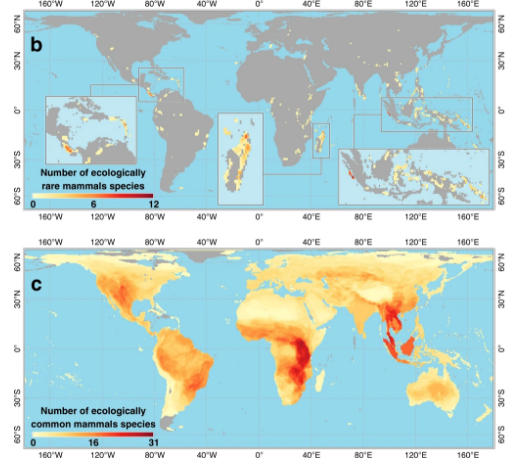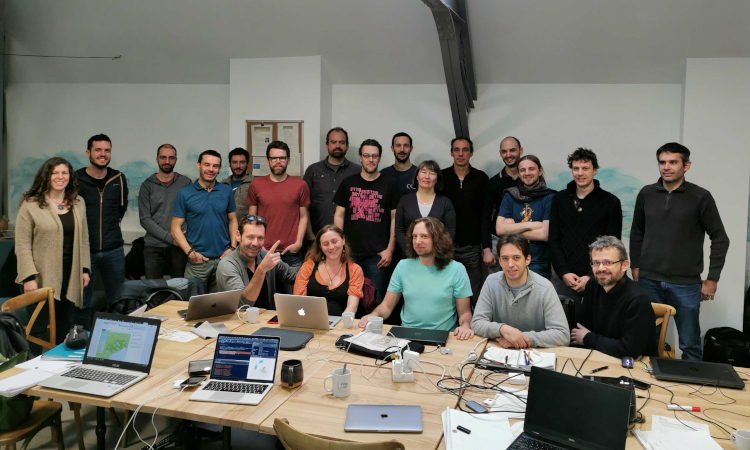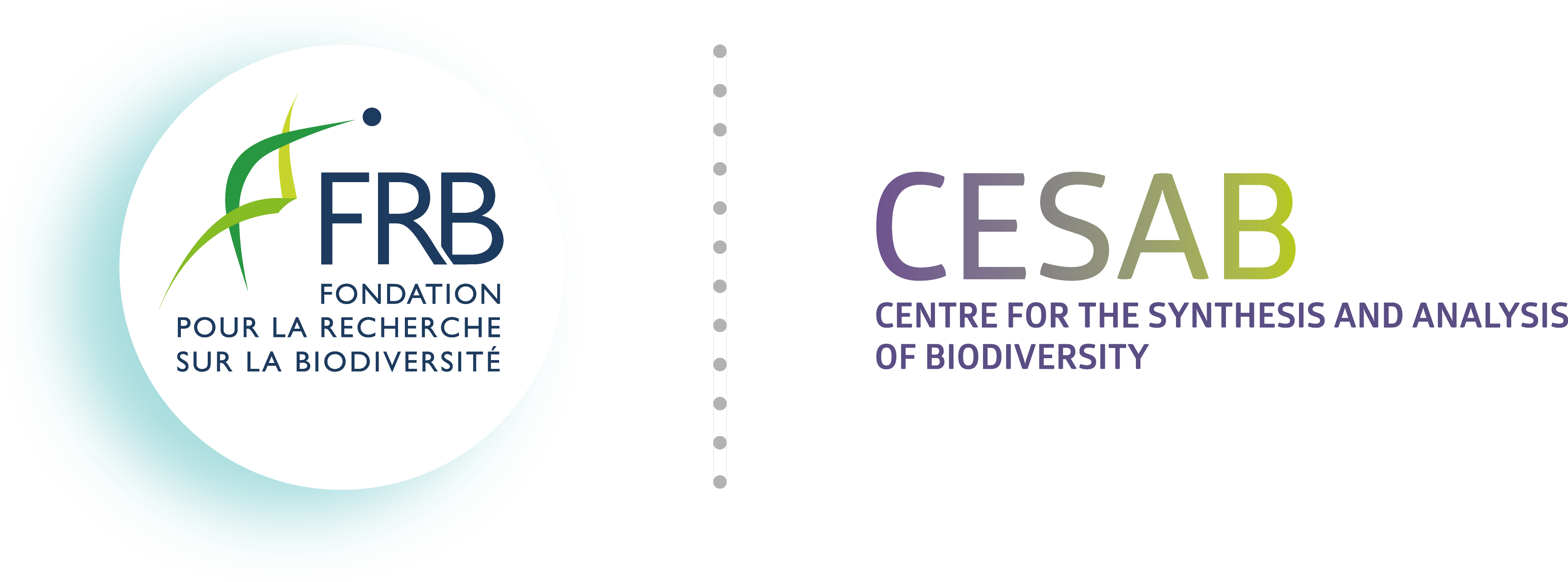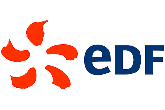FREE 1
Causes and consequences of functional rarity from local to global scales

Rarity has always fascinated conservation and evolutionary biologists with the goal to uncover species characteristics causing extinction risk. Recently, some results suggest that rare species may over-contribute to the diversity of traits within communities thus supporting irreplaceable roles while others show that rare species are functionally redundant with common species. Beyond the rarity of species, the rarity of functions played by species, coined as functional rarity, is thus key to understand the impact of biodiversity decline on ecosystem functioning. However, functional rarity still lacks a clear definition and a quantitative framework while its emergence and maintenance within communities is largely unknown.
The aim of the FREE working group is to advance the concept of functional rarity and examine the causes and consequences of functional rarity from local to global scales. FREE‘s first results show that:
- common assumptions notwithstanding, rare species can play unique and essential ecological roles,
- rare species are already more threatened by humans than ecologically common species and will be more impacted by future climate change,
- hotspots of functional rarity differ from the areas where the most vulnerable species are found. This has major implications for species and ecosystem conservation where functional rarity appears to be an additional criterion to be considered urgently for the establishment of lists of so-called species at risk and for deciding on the location and size of areas to be protected.

Number of ecologically rare (b) and common (c) mammals (Loiseau et al., 2020)

Members of the FREE project at CESAB in October 2021

Principal Investigators (PIs) :
Cyrille VIOLLE – CEFE-CNRS (France)
Adam ALGAR – University of Nottingham (UK); Arnaud AUBER – IFREMER Boulogne-sur-mer (France); Marc CADOTTE – University of Toronto, (Canada); Pierre DENELLE -CNRS (France); Brian ENQUIST – University of Arizona (USA); Noah FIERER – University of Colorado (USA); Matthias GRENIE – CNRS (France); Gaurav KANDLIKAR – University of California (USA); Christopher KLAUSMEIER – Michigan State University (USA); Nathan KRAFT, University of Maryland (USA); Sébastien LAVERGNE -Université de Grenoble (France); Helena LITCHMAN – Michigan State University (USA); Anthony MAIRE – EDF (France); Brian MAITNER – University of Arizona (USA); Camille MARTINEZ – Grenoble University (France); Brian MCGILL – University of Maine (USA); Matthew MCLEAN – Ifremer (France); David MOUILLOT – University of Montpellier (France); Nicolas MOUQUET – CNRS Montpellier (France); François MUNOZ – Grenoble University (France); Juliette MURGIER – Ifremer (France); Annette OSTLING -University of Michigan (USA); Caroline TUCKER – University of Colorado (USA); Wilfried THUILLER – CNRS Grenoble (France); Sébastien VILLEGIER – CNRS (France); Lucie ZINGER – University of Paul Sabatier (France).
FREE1 presented their results in a webconference (CESABINAR) that you can (re)watch here:
[27] Auber A, Waldock C, Maire A, Goberville E, Albouy C, Algar AC, McLean M, Brind'Amour A, Green AL, Tupper M, Vigliola L, Kaschner K, Kesner-Reyes K, Beger M, Tjiputra J, Toussaint A, Violle C, Mouquet N, Thuiller W & Mouillot D (2022) A functional vulnerability framework for biodiversity conservation. Nature Communications, 13, 4774. DOI: 10.1038/s41467-022-32331-y.
[26] Brun P, Violle C, Mouillot D, Mouquet N, Enquist BJ, Munoz F, Münkemüller T, Ostling A, Zimmermann NE & Thuiller W (2022) Plant community impact on productivity: Trait diversity or key (stone) species effects? Ecology Letters, 25, 913–925. DOI: 10.1111/ele.13968.
[25] Delalandre L, Gaüzère P, Thuiller W, Cadotte MW, Mouquet N, Mouillot D, Munoz F, Denelle P, Loiseau N, Morin X & Violle C (2022) Functionally distinct tree species support long-term productivity in extreme environments. Proceedings of the Royal Society B: Biological Sciences, 289, 20211694. DOI: 10.1098/rspb.2021.1694.
[24] Feng X, Enquist BJ, Park DS, Boyle B, Breshears DD, Gallagher RV, Lien A, Newman EA, Burger JR, Maitner BS, Merow C, Li Y, Huynh KM, Ernst K, Baldwin E, Foden W, Hannah L, Jorgensen PM, Kraft NJB, Lovett JC, Marquet PA, McGill BJ, Morueta‐Holme N, Neves DM, Núñez‐Regueiro MM, Oliveira‐Filho AT, Peet RK, Pillet M, Roehrdanz PR, Sandel B, Serra‐Diaz JM, Símová I, Svenning J, Violle C, Weitemier TD, Wiser S & López‐Hoffman L (2022) A review of the heterogeneous landscape of biodiversity databases: Opportunities and challenges for a synthesized biodiversity knowledge base. Global Ecology and Biogeography, 31, 1242–1260. DOI: 10.1111/GEB.13497.
[23] Guo W-Y, Serra-Diaz JM, Schrodt F, Eiserhardt WL, Maitner BS, Merow C, Violle C, Anand M, Belluau M, Bruun HH, Byun C, Catford JA, Cerabolini BEL, Chacón-Madrigal E, Ciccarelli D, Cornelissen JHC, Dang-Le AT, de Frutos A, Dias AS, Giroldo AB, Guo K, Gutiérrez AG, Hattingh W, He T, Hietz P, Hough-Snee N, Jansen S, Kattge J, Klein T, Komac B, Kraft NJB, Kramer K, Lavorel S, Lusk CH, Martin AR, Mencuccini M, Michaletz ST, Minden V, Mori AS, Niinemets Ü, Onoda Y, Peñuelas J, Pillar VD, Pisek J, Robroek BJM, Schamp B, Slot M, Sosinski ÊE, Soudzilovskaia NA, Thiffault N, van Bodegom P, van der Plas F, Wright IJ, Xu W-B, Zheng J, Enquist BJ & Svenning J-C (2022) High exposure of global tree diversity to human pressure. Proceedings of the National Academy of Sciences of the United States of America, 119, e2026733119. DOI: 10.1073/pnas.2026733119.
[22] Magneville C, Loiseau N, Albouy C, Casajus N, Claverie T, Escalas A, Leprieur F, Maire E, Mouillot D & Villéger S (2022) mFD: an R package to compute and illustrate the multiple facets of functional diversity. Ecography, 44, 1–15. DOI: 10.1111/ecog.05904.
[21] Sabatini FM, Jiménez-Alfaro B, Jandt U, Chytry M, Field R, Kessler M, Lenoir J, Schrodt F, Wiser SK, Arfin Khan MAS, Attorre F, Cayuela L, De Sanctis M, Dengler J, Haider S, Hatim MZ, Indreica A, Jansen F, Pauchard A, Peet RK, Petrik P, Pillar VD, Sandel B, Schmidt M, Tang Z, van Bodegom P, Vassilev K, Violle C, Alvarez-Davila E, Davidar P, Dolezal J, Hérault B, Galán-de-Mera A, Jiménez J, Kambach S, Kepfer-Rojas S, Kreft H, Lezama F, Linares-Palomino R, Monteagudo Mendoza A, N'Dja JK, Phillips OL, Rivas-Torres G, Sklenár P, Speziale K, Strohbach BJ, Vásquez Martínez R, Wang H-F, Wesche K & Bruelheide H (2022) Global patterns of vascular plant alpha diversity. Nature Communications, 13, 4683. DOI: 10.1038/s41467-022-32063-z.
[20] Gross N, Le Bagousse-Pinguet Y, Liancourt P, Saiz H, Violle C & Munoz F (2021) Unveiling ecological assembly rules from commonalities in trait distributions. Ecology Letters, 24, 1668–1680. DOI: 10.1111/ele.13789.
[19] Mouillot D, Loiseau N, Grenié M, Algar AC, Allegra M, Cadotte MW, Casajus N, Denelle P, Guéguen M, Maire A, Maitner B, McGill BJ, McLean M, Mouquet N, Munoz F, Thuiller W, Villéger S, Violle C & Auber A (2021) The dimensionality and structure of species trait spaces. Ecology Letters, 24, 1988–2009. DOI: 10.1111/ele.13778.
[18] Murgier J, McLean M, Maire A, Mouillot D, Loiseau N, Munoz F, Violle C & Auber A (2021) Rebound in functional distinctiveness following warming and reduced fishing in the North Sea. Proceedings of the Royal Society B: Biological Sciences, 288, 20201600. DOI: 10.1098/rspb.2020.1600.
[17] Sala E, Mayorga J, Bradley D, Cabral RB, Atwood TB, Auber A, Cheung W, Costello C, Ferretti F, Friedlander AM, Gaines SD, Garilao C, Goodell W, Halpern BS, Hinson A, Kaschner K, Kesner-Reyes K, Leprieur F, McGowan J, Morgan LE, Mouillot D, Palacios-Abrantes J, Possingham HP, Rechberger KD, Worm B & Lubchenco J (2021) Protecting the global ocean for biodiversity, food and climate. Nature, 592, 397–402. DOI: 10.1038/s41586-021-03371-z.
[16] Denelle P, Violle C & Munoz F (2020) Generalist plants are more competitive and more functionally similar to each other than specialist plants: insights from network analyses. Journal of Biogeography, 47, 1922–1933. DOI: 10.1111/jbi.13848.
[15] Grenié M, Violle C & Munoz F (2020) Is prediction of species richness from stacked species distribution models biased by habitat saturation? Ecological Indicators, 111, 105970. DOI: 10.1016/j.ecolind.2019.105970.
[14] Laroche F, Violle C, Taudière A & Munoz F (2020) Analyzing snapshot diversity patterns with the Neutral Theory can show functional groups' effects on community assembly. Ecology, 101, e02977. DOI: 10.1002/ecy.2977.
[13] Loiseau N, Mouquet N, Casajus N, Grenié M, Guéguen M, Maitner B, Mouillot D, Ostling A, Renaud J, Tucker C, Velez L, Thuiller W & Violle C (2020) Global distribution and conservation status of ecologically rare mammal and bird species. Nature Communications, 11, 5071. DOI: 10.1038/s41467-020-18779-w.
[12] Mahaut L, Cheptou P-O, Fried G, Munoz F, Storkey J, Vasseur F, Violle C & Bretagnolle V (2020) Weeds: Against the rules? Trends in Plant Science, 25, 1107–1116. DOI: 10.1016/j.tplants.2020.05.013.
[11] Mahaut L, Fort F, Violle C & Freschet GT (2020) Multiple facets of diversity effects on plant productivity: Species richness, functional diversity, species identity and intraspecific competition. Functional Ecology, 34, 287–298. DOI: 10.1111/1365-2435.13473.
[10] Thuiller W, Gravel D, Ficetola GF, Lavergne S, Münkemüller T, Pollock LJ, Zimmermann NE & Mazel F (2020) Productivity begets less phylogenetic diversity but higher uniqueness than expected. Journal of Biogeography, 47, 44–58. DOI: 10.1111/jbi.13630.
[09] Denelle P, Violle C & Munoz F (2019) Distinguishing the signatures of local environmental filtering and regional trait range limits in the study of trait–environment relationships. Oikos, 128, 960–971. DOI: 10.1111/oik.05851.
[08] Enquist BJ, Feng X, Boyle B, Maitner BS, Newman EA, Jorgensen PM, Roehrdanz PR, Thiers BM, Burger JR, Corlett RT, Couvreur TLP, Dauby G, Donoghue JC, Foden W, Lovett JC, Marquet PA, Merow C, Midgley G, Morueta-Holme N, Neves DM, Oliveira-Filho AT, Kraft NJB, Park DS, Peet RK, Pillet M, Serra-Diaz JM, Sandel B, Schildhauer MP, Símová I, Violle C, Wieringa JJ, Wiser SK, Hannah L, Svenning J-C & McGill BJ (2019) The commonness of rarity: Global and future distribution of rarity across land plants. Science Advances, 5, eaaz0414. DOI: 10.1126/sciadv.aaz0414.
[07] McLean M, Auber A, Graham NAJ, Houk P, Villéger S, Violle C, Thuiller W, Wilson SK & Mouillot D (2019) Trait structure and redundancy determine sensitivity to disturbance in marine fish communities. Global Change Biology, 25, 3424–3437. DOI: 10.1111/gcb.14662.
[06] Echeverría-Londoño S, Enquist BJ, Neves DM, Violle C, Boyle B, Kraft NJB, Maitner BS, McGill BJ, Peet RK, Sandel B, Smith SA, Svenning J-C, Wiser SK & Kerkhoff AJ (2018) Plant functional diversity and the biogeography of biomes in North and South America. Frontiers in Ecology and Evolution, 6, 219. DOI: 10.3389/fevo.2018.00219.
[05] Grenié M, Mouillot D, Villéger S, Denelle P, Tucker CM, Munoz F & Violle C (2018) Functional rarity of coral reef fishes at the global scale: Hotspots and challenges for conservation. Biological Conservation, 226, 288–299. DOI: 10.1016/j.biocon.2018.08.011.
[04] Blonder B, Morrow CB, Maitner BS, Harris DJ, Lamanna C, Violle C, Enquist BJ & Kerkhoff AJ (2017) New approaches for delineating n-dimensional hypervolumes. Methods in Ecology and Evolution, 9, 305–319. DOI: 10.1111/2041-210X.12865.
[03] Grenié M, Denelle P, Tucker CM, Munoz F & Violle C (2017) funrar: An R package to characterize functional rarity. Diversity and Distributions, 23, 1365–1371. DOI: 10.1111/ddi.12629.
[02] Violle C, Thuiller W, Mouquet N, Munoz F, Kraft NJB, Cadotte MW, Livingstone SW, Grenié M & Mouillot D (2017) A common toolbox to understand, monitor or manage rarity? A response to Carmona et al. Trends in Ecology & Evolution, 32, 891–893. DOI: 10.1016/j.tree.2017.10.001.
[01] Violle C, Thuiller W, Mouquet N, Munoz F, Kraft NJB, Cadotte MW, Livingstone SW & Mouillot D (2017) Functional rarity: The ecology of outliers. Trends in Ecology & Evolution, 32, 356–367. DOI: 10.1016/j.tree.2017.02.002.
Auber A, Waldock C, Maire A, Goberville E, Albouy C, Algar AC, McLean M, Brind’Amour A, Green AL, Tupper M, Vigliola L, Kaschner K, Kesner-Reyes K, Beger M, Tjiputra J, Toussaint A, Violle C, Mouquet N, Thuiller W & Mouillot D (2022) A functional vulnerability framework for biodiversity conservation. Nature Communications, 13, 4774. doi: 10.1038/s41467-022-32331-y.
- Communiqué de presse : A new method to assess ecosystem vulnerability and protect biodiversity [EN], Une nouvelle méthode pour évaluer la vulnérabilité des écosystèmes et protéger la biodiversité [FR]
- Communication EDF : Comment évaluer la vulnérabilité des écosystèmes ? La R&D d’EDF publie dans Nature Communications
- Presse francophone : CNRS, Ifremer, IRD, Sorbonne Université, France Biodiversity, Actu Environnement, Presse Agence
- Presse internationale : Lakehead University
Sala E, Mayorga J, Bradley D, Cabral RB, Atwood TB, Auber A, Cheung W, Costello C, Ferretti F, Friedlander AM, Gaines SD, Garilao C, Goodell W, Halpern BS, Hinson A, Kaschner K, Kesner-Reyes K, Leprieur F, McGowan J, Morgan LE, Mouillot D, Palacios-Abrantes J, Possingham HP, Rechberger KD, Worm B & Lubchenco J (2021) Protecting the global ocean for biodiversity, food and climate. Nature, accepted. doi: 10.1038/s41586-021-03371-z.
- Communiqué de presse : Protéger l’océan pour résoudre conjointement les crises du climat, de l’alimentation et de la biodiversité [FR], Study in Nature: Protecting the Ocean Delivers a Comprehensive Solution for Climate, Fishing and Biodiversity [EN]
- Presse française : Ifremer, Université Montpellier, CNRS, La Provence, Actu-Environnement, RFI, AJSPI, Yahoo, Futura-Sciences, Conso Globe, DestiMed, Figaro Nautisme, France24, Agri-Mutuel, Camaderie Limited, EuroNews, Marine & Océans, France Info.
- Presse internationale : National Geographic press release, Mongabay, Spacedaily, The Energy Mix, CM (Portugal), Noticias Ao Minuto (Portugal), Publico (Portugal), RTP (Portugal), Visao (Portugal), Le Journal de Montréal (Canada), Climate Home News (UK), BBC News (UK), Financial Times (UK), The Guardian (UK), The Independent (UK), Sky (UK), Coast FM (UK), Thomson Reuters Foundation (UK), Cosmos (Australia), Boersen Zeitung (Germany), Finanz Nachricten (Germany), Handelsblatt (Germany), Onvista (Germany), ProPlanta (Germany), Tagesspeigel (Germany), Klamm (Germany), Trends der Zukunft (Austria), Salzburger Nachricten (Austria), ORF (Austria), Wiener Zeitung (Austria), El Pais (Spain), Euronews (Belgium), Yahoo (USA), Earth (USA), New-York Times (USA), Time (USA), Smithsonian (USA), Inhabitat (USA), Futurity (USA), MarketWatch (USA), The Academic Times (USA), Saving Seafood (USA), Marine Link (USA), World Economic Forum (USA), Modern Ghana (Ghana), Semana (Columbia), Singapore News (Singapore), Straits Times (Singapore), Estadao (Brazil), Duurzaam Nieuws (Netherlands), NRK (Norway), C24 (Czech Republic), El Siglo (Mexico), Eco-Business, Quatar Tribune (Quatar), Wyborcza (Poland), Le Donne del Food (Italy), I3 Investor (Malaysia), Total Croatia News (Croatia), Marasi News (UAE), HVG (Hongrie), Heaven (Spain), Videnskab (Germany), Technology Times, Tierwelt (Suisse), Unfold Times (USA), Science Alert, MSN, The Middle East North Africa Financial Network, Gulf times (Quatar), Neueus Deustchland (Germany), Japan Today (Japan), Portal Grada Kastela (Croatia), Lider Media (Croatia), The Jordan Times, OltNews (USA), Qubit (Croatia), IFL Science, The Entrepreneur (USA), Knack (Belgium), Vaol (Hongrie), GeosNews (Italy), You Feed It! (Italy), GreenReport (Italy), AllAfrica, The Seatlle Times (USA), Education News Canada (Canada), Coastal News Today (USA), East African Business Week, Popular Science (USA), Nach Welt (Germany), Chron (USA), Tekniikanmaailma (Finland), The Wahington Post (USA), EcoWatch (USA), Wochenblatt (Germany), DNYUZ (USA), Global Banking and Finance Review (UK), Firstpost (India), Newsrust (USA), Mondiaal Nieuws (Belgium), Dhaka Tribune (Bengladesh), Bengladesh Sagbad (Bengladesh), ECEEE (Sweden), St Catherines Standard (Canada), The Hamilton Spectator (Canada), Toronto Star (Canada), AzoLifeSciences (UK), The Japan Times (Japan), The European Sting (South Africa), The Swaddle (India), Sight Magazine (Australia), Press Form (USA), 24 Globe News (India), Bilyonaryo (Philipines), RTL Today (Luwembourg)
Loiseau, N., Mouquet, N., Casajus, N. et al. Global distribution and conservation status of ecologically rare mammal and bird species. Nat Commun 11, 5071 (2020). https://doi.org/10.1038/s41467-020-18779-w
- Communiqué de presse : Rareté écologique des oiseaux et des mammifères terrestres : la double peine
- Presse française : communiqué de presse CNRS, Actu-Environnement, Le Télégramme, RFI, Yahoo! Actualités, Ouest France, JNews, Le Figaro, La gazette du laboratoire, Le Matin Dimanche, La science s’amuse-Divergence FM, Le courrier de la Nature, LUM.
- Presse internationale : CNRS press release, Le journal de Montréal, Tilt, La Jornada, Green report, Eurekalert!, VivaAfrik, Radio Canada, Science Mag, Phys.org, Science Daily, RTS, El tiempo, ABC, La Nation, La prensa, Newsylist, Limnews, Journal de Québec, ENN, 7thSpace, Sciencecodex, Brightsurf.
